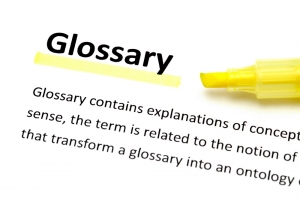Bankruptcy Terms Can Be Confusing – Let Us Help
 If you are in a place in your life where debt is overwhelming your personal and business life, you may need to consider filing for bankruptcy. We know that the thought of filing for bankruptcy can be scary and stressful, but please know that this is a process allowed by law to help you get back onto firm financial footing.
If you are in a place in your life where debt is overwhelming your personal and business life, you may need to consider filing for bankruptcy. We know that the thought of filing for bankruptcy can be scary and stressful, but please know that this is a process allowed by law to help you get back onto firm financial footing.
If you are considering filing for bankruptcy, please seek legal assistance. An Arizona bankruptcy attorney will be able to walk you through the entire process, helping you understand all of your options before making any choices.
Some Common Bankruptcy Terms
Because bankruptcy can be confusing, we wanted to give a basic overview of some terms you may see when beginning this process. Please know that this is not a complete list and that your bankruptcy attorney will be able to help you navigate these waters.
- Arrears – how much money you are behind on your mortgage. This will be treated differently depending on which type of bankruptcy you file for.
- Assume – an agreement to continue performing duties under a contract of lease, generally this deals with contracts on utilities, storage units, apartment leases, etc.
- Automatic stay – this is an order from the bankruptcy court that automatically stops any lawsuits, garnishments, foreclosures, and collects against you.
- Bankruptcy – this is a process under federal law that helps people get their finances under control when they have more debt than they can handle based on their income level.
- Bankruptcy petition – the document you file with the bankruptcy court that begins the bankruptcy case.
- Chapter 7 bankruptcy – this is the type of bankruptcy that allows for the liquidation of all non-exempt assets an individual has in order to cover their unsecured debts.
- Chapter 13 bankruptcy – this type of bankruptcy allows individuals to reorganize their debts into a 3- to 5-year repayment plan. You will pay a certain amount to a trustee each month who will pay your creditors based on the order of priority.
- Confirmation – this is the final approval of the bankruptcy court of an individual’s Chapter 13 plan.
- Creditor – the person or business to which a debtor owes money to. Creditors can be individuals, businesses, banks, etc.
- Debtor – this is the person seeking protection from creditors through bankruptcy.
- Discharge – is the purpose of bankruptcy. It is a paper that tells your creditors that you do not have the ability to pay the debt. This wipes out the debt.
- Dischargeable debt – this is a debt that is allowed to be discharged under the law and can include credit card debt, medical bill debt, and more.
- Exemptions – this refers to property owned by a debtor that state or federal law protect, things that cannot be liquidated during the bankruptcy process.
- First meeting of creditors – this is commonly referred to as a 341 hearing, and it when you meet with your attorney, the trustee of your case, and your creditors.
- Means test – this is a test used to determine whether a debtor is able to file for Chapter 7 or Chapter 13 and is based on income level.
- Non-dischargeable debt – a debt that cannot be discharged during bankruptcy, typically student loans, back-taxes owed, back child support, etc.
- Priority claims – refers to the kinds of debt that must be paid first during Chapter 13 bankruptcies.
- Trustee – this is the person in charge of your bankruptcy case, the person who is responsible for distributing money to your creditors from your liquidated assets or repayment plan.
What You Can Do Now
You do not have to live a life in overwhelming debt. If your finances have reached a breaking point, please consider seeking legal assistance. An Arizona bankruptcy attorney will be able to talk with you about all of your options available. One of those options may be bankruptcy.
We hope this article has given you an idea of what some of the common bankruptcy terms mean. This does not have to be a scary process, so please seek assistance today so you can get yourself back on firm financial footing.





